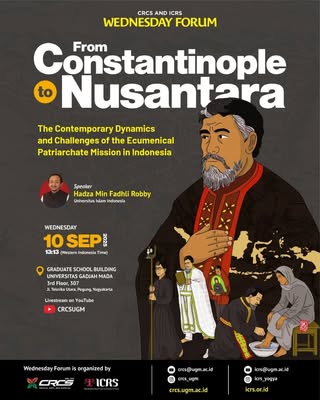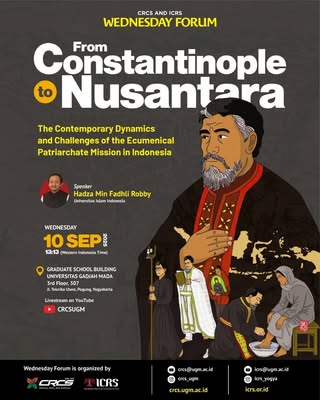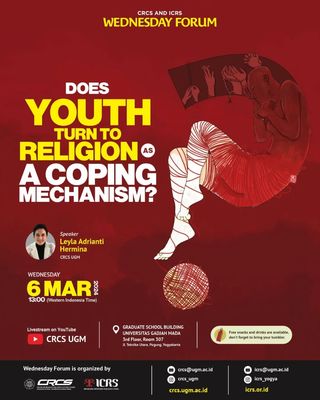
Anthon Jason
“You will realize that trees, birds, animals, they connect to you rather than your mind. If you just live with your mind, you will live in isolation, in isolated ways. You try to come up with a solution in your brain. And there is no solution in your brain because there are so many illusions and delusions in your brain. And the solution is being interbeing”—Fuji Riang Prastowo
Fuji Riang Prastowo, also known as Fuji, is an assistant professor of sociology at Universitas Gadjah Mada and a doctoral candidate at the Indonesian Consortium for Religious Studies (ICRS). In his Wednesday Forum presentation on October 8, 2025, titled “From Isolation to Interbeing: Buddhist Psychology for Suicide Prevention and Mental Health Advocacy,” Fuji presented his main argument: the current standard clinical psychology approach, referred to as "Western Psychology," is limited by its focus on individual therapy and often leads to isolation. In contrast, he advocated for an approach grounded in Buddhist principles—karuna (compassion), anatta (non-self), and kalyanamitta (spiritual friendship)—to address mental health through community care and relational healing.
In his presentation, Fuji shared about the interfaith meditation communities he has started for young people dealing with mental illness. Participants will observe the constructive interaction between spiritual peers and institutional support. This presentation is rooted in epistemologies and cognitive justice from the Global South. It challenges dominant paradigms and invites a reimagining of mental health advocacy as community care and compassionate resistance. Fuji's research experience, which is centered on the nexus of mental health, ethnicity, and spirituality in Southeast Asia, has endowed him with a wealth of experience in social advocacy, interfaith engagement, and applied research. Consequently, he advocates for the implementation of culturally responsive frameworks that aim to enhance mental well-being and inclusivity.
From Isolation to Interbeing: A Critique of Western Psychology
The main premise is that mental health advocacy must go beyond individual therapy towards relational healing and collective care. Fuji cites the Zen Buddhist concept of interbeing (coined by Thich Nhat Hanh), which states that individuals do not exist in isolation, but are shaped by their relationships with other people and the environment. Psychological suffering, according to this view, arises when separation destroys this natural interdependence.
Fuji has expressed disapproval of the Western psychological approach that emphasizes the autonomous individual, the "absolute self," which is characterized by a linear narrative of trauma. Conversely, Buddhist psychology eschews the notion of a permanent and singular self (anatta). The analogy employed is that of a river. In Western thought, the river is believed to carry the same water (trauma) throughout life; however, in Buddhism, the river is regarded as undergoing constant change, thereby facilitating the renewal of consciousness at every moment. Consequently, the concepts of identity and suffering are regarded as transient phenomena, rather than enduring conditions. However, rather than positioning 'Western psychology' as homogeneous and totally opposed, what this discussion seeks to criticize is individualistic tendencies while opening up dialogue with relational and communitarian approaches.
Buddhist Principles and Mental Health Case Studies
In his presentation, Fuji reframes therapy through three Buddhist virtues:
- Karuna (compassion): compassionate listening and relational support replace hierarchical treatment models.
- Anatta (non-self): dissolving ego and possessiveness reduces suffering by softening personal identity boundaries.
- Kalyanamitta (spiritual friendship): networks of supportive peers and mentors sustain well-being in ways traditional institutions cannot.
Fuji illustrates these ideas with detailed case studies of students facing severe crises, including suicidality and psychosis. His intervention involves forming informal peer networks and compassionate companionship, bridging students, families, and lecturers. These acts, what he calls “artificial kalyanamitta,” replace bureaucratic detachment with social solidarity and human warmth.
He introduces a three-tier model of advocacy, ranging from peer-based support to clinical integration. In contexts like Indonesia, where mental health infrastructures are limited, he argues that spiritual and social forms of care fill the gap left by state and biomedical systems, aligning with Global South epistemologies and cognitive justice. The concept of “interbeing” becomes both psychological and political. Fuji situates it within the broader Global South struggle for epistemic justice, recognizing that non-Western systems of knowledge, such as Buddhist psychology, are not alternative but equally valid paradigms.
Critical Reflection: Interbeing in the Context of Modern Psychology
Fuji's presentation occupies an interesting position between the realm of science and spirituality. He invites us to revisit what "healing" really means, bringing together Buddhist philosophy and modern psychology. In it, there is one fundamental question: what if mental health is not a purely personal condition, but a shared moral state? The idea of interbeing, taken from the Zen teachings of Thich Nhat Hanh, is not only a spiritual metaphor but also an epistemological challenge for today's world of psychology.
Over the past two decades, psychology has increasingly realized that separation is not just a social problem, but an actual disease. Social neuroscientist Matthew Lieberman calls the human brain "designed to connect," while the relational-cultural theory developed by Jean Baker Miller and Judith Jordan asserts that the root of human suffering lies in disconnection. In this case, Fuji's ideas are in tune with these scientific findings, only he articulates them in the language of Buddhism. According to him, alienation is not born of brain disorders or personality problems alone, but of avidyā, mental blindness to the fact that our existence is interconnected. The healing process, therefore, is not merely therapy, but also enlightenment: the realization that our suffering is part of the suffering of all beings.
A Mind Broader Than the Individual
This view of interconnectedness is in line with new directions in cognitive science and contemplative research. A number of recent studies, such as Richard Davidson's research on loving-kindness meditation, show that empathy and a sense of connectedness can reshape the brain's structure, strengthening emotional balance. If modern cognitive therapy aims to change internal thought patterns, then interbeing extends that process to include the world around us. In Mahāyāna teachings, the principle of pratītyasamutpāda (interdependent causation) states that every mental state arises due to countless conditions.
The Chinese Mahāyāna tradition, especially the Huayan school, developed this idea into a comprehensive view of reality. The Huayan philosopher Fazang once used the analogy of Indra's Net to explain how all things reflect each other, like jewels reflecting infinitely. Translated into a psychological context, this means that mental health cannot be separated from social relationships, the living environment, and ethical dimensions. Fuji's efforts to connect students, lecturers, families, and communities in a shared support network are a concrete manifestation of this view: healing is "networked," not individual.
Towards Ethics of Interbeing
Fuji's presentation can be analogized with other terms, such as "What if therapy became ethical ecology?" This would be a space where compassion circulates like air among all participants. In the context of Mahayana psychology, the concept of an ecological self finds expression in the Lotus Sutra’s conception of "One Vehicle." From this standpoint, it is posited that all beings possess the inherent potential for awakening, reflecting a radical inclusivity in spiritual growth rather than a psychotherapeutic framework. The mind is not in neurons, but in relationships. Similarly, modern systemic psychology is now exploring "network mind," studying how emotions spread throughout groups through mirror-neuron resonance and cultural modeling. Therefore, interbeing is not a mystical abstraction; it is an emerging science.
While Fuji's work may not fully resolve all philosophical tensions between Buddhism and modern psychology, it contributes a significant perspective that science alone cannot provide: an ethics of interconnected existence. The purpose of this article is to explore the interdisciplinary area where science and spirituality intersect. Theoretical claims are presented as conceptual offerings that require ongoing testing through empirical evidence across various cultural contexts.
Ultimately, in an era of exhaustion, competition, and loneliness, Fuji’s proposition is radical yet humane: that healing begins not in isolation, but in recognizing, as Buddha did under the Bodhi Tree, that nothing, not even our suffering, exists independently. Conversely, the most effective way to create a healthy, happy, and joyful psychological state that lasts is by cultivating compassion. True happiness is found in the act of making other entities happy.
---------------------------------------------------------------------------------------------------------------------------------------------------------------------------------
* The present article was composed in October, which corresponds to World Mental Health Day on October 10. However, subsequent to its completion, a disheartening revelation emerged: a tragic incident involving a student at Udayana University in Bali, who committed suicide due to the distressing impact of bullying. It is hoped that this will engender a greater love, appreciation, and respect for life. It is imperative to recognize that each life possesses an incalculable value. https://kemdiktisaintek.go.id/kabar-dikti/kabar/belasungkawa-untuk-timothy-kemdiktisaintek-serukan-kampus-untuk-ciptakan-ruang-aman-bagi-sivitas-akademika/









